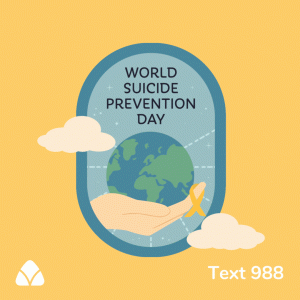 When it comes to preventing suicide, sticking to questions like “Are you OK?” or “Is everything alright?” isn’t usually enough. These questions can certainly help us discover if someone we know is struggling with their mental health (an important first step in supporting them), but they rarely dive deep enough.
When it comes to preventing suicide, sticking to questions like “Are you OK?” or “Is everything alright?” isn’t usually enough. These questions can certainly help us discover if someone we know is struggling with their mental health (an important first step in supporting them), but they rarely dive deep enough.
And suicide is about as deep as it gets.
Even those in mental health professions sometimes struggle to bring up suicide. Beyond misconceptions about suicidal ideation (no, asking about suicide does not “put the idea in someone’s head”), one of the most common reasons people avoid the topic is because it can be.… well… awkward. Suicide is an extremely loaded word. Naturally, we want to shy away from a subject filled with so much emotional pain and stigma. But we have to fight this inclination. Lives depend on our ability to push past it.
Crisis counselors at CommUnity (and all 988 centers) are trained to ask directly about suicide in every single conversation. We do this, at least in part, because it signals to the caller that we are ready to hear what they have to say. It’s common for concerned friends and family of people in crisis to use vague language (“Do you want to hurt yourself?”) because they are worried about upsetting them. It’s an understandable urge, and comes from a place of good intentions. Unfortunately, though, that vagueness can unconsciously communicate that they aren’t prepared (or willing) to have the difficult conversation ahead. Those struggling with suicidal thoughts are frequently looking for a safe person to disclose what’s been on their mind. Asking directly goes a long way to proving that you are that person.
There is no wrong time to ask someone if they are having thoughts of suicide. Your intuition will likely let you know when someone you know is really struggling. So how do you get this conversation started? You can begin the same way our counselors do, by listening. Explore how the other person is feeling. What’s been going on in their life recently? Listen particularly closely for phrases like, “I just don’t want to be here anymore,” which can indicate that suicide is on their mind. When you feel you have a good grasp of where they are at, it’s time to talk about suicide. Take a deep breath… and ask “Are you thinking about suicide?” in the calmest, gentlest, most caring way you can.
Once the question is out in the open, be prepared for a bit of silence. They might sigh with relief, glance around the room, or clearly show surprise. No matter how the other person initially reacts, it’s important that you give enough time for them to answer honestly. It’s OK to be terrified of what they are going to say. Try to keep breathing. Focus on how much you care about them. Wait.
If you or someone you love is in need of support, please don’t hesitate to reach out. Text or call 988 to be connected with a counselor 24/7.
To have Mobile Crisis dispatched to your location, call 1-855-581-8111 and ask for mobile crisis.